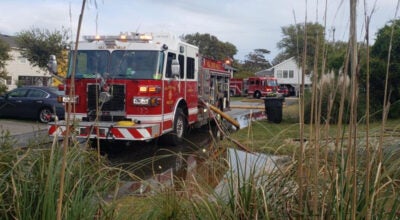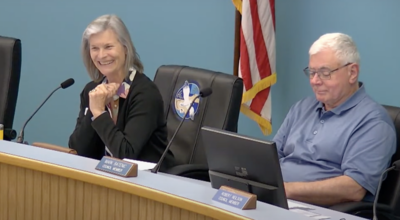Kitty Hawk Town Council votes for commercial fishermen
Published 2:34 pm Sunday, February 11, 2018
Kitty Hawk Town Council at its Feb. 5 regular session meeting took a stand for commercial fishermen, rezoned two Putter Lane lots, and voted to allow accessory dwelling units on residential lots under certain conditions.
Late in the evening, and after a number of citizen had departed the meeting, Council members spent several minutes discussing proposed changes for commercial fishing that could impact Kitty Hawk and the rest of North Carolina.
Currently on the recommendation of three commission members, the NC Marine Fisheries Commission is accepting public comment on five

KITTY HAWK Councilman Jeff Pruitt gave several reasons to vote against a North Carolina Marine Fisheries proposal to change the definition of a Commercial Fishing Operation at Council’s Feb. 5 meeting. (P.S. Ruckle Jr. file photo)
recommended changes to its commercial fishing license structure. Among the proposed requirements for holding a Standard Commercial Fishing License are:
- That 50 percent of earned income must come from the Trip Ticket Program as in the Fisheries Reform Act of 1997.
- A fisherman must have 36 trip tickets per year.
- For crewmen who do not have trip tickets, but are bona fide commercial fishermen, proof of income from a commercial fishing operation, business, etc. doing business in North Carolina of $10,000 or more per year.
- Inactive Standard Commercial Fishing Licenses that do not have any of the above with a three-year running average, would go into a special pool may be reissued to the original holder subject to conditions.
- Create a $100 per year Heritage Standard Commercial Fishing License for inactive families or retired with a one-time $100 fee.
The proposals would require legislative approval.
After Mayor Gary Perry advised the issue was pulled off the Consent Agenda to allow comments, Councilman Jeff Pruitt opened the discussion saying “I am a commercial fisherman and they’re trying to come up with a number to say I’m not, that kind of hurt my feelings.”
Pruitt went on to say there were several issues with the changes that bother him including the potential for having interests in other businesses or income from stocks that could impact a fisherman’s status.

ROBERT SPENCER OLIVER was one of three speakers at the Feb. 5 Kitty Hawk Town Council meeting asking that a rezoning request be denied for two Putter Lane lots to allow hospitals, medical centers and other related uses. Council voted in favor of the change on the grounds that adding medical services to the community overrides the interests of a few nearby property owners. (YouTube Screenshot image)
“You could be in another kind of business and have a bad year crabbing and you’re no longer in business,” offered Pruitt. “Seems like they are trying to get rid of commercial fishermen in North Carolina. If that happens we’re all going to buy all our seafood from overseas. It’s going to hurt me, and Ervin (Bateman) is in the restaurant business and it’s going to hurt him.”
Bateman said he agreed with Pruitt, adding that in the past he would buy 45,000 pounds of North Carolina shrimp in addition to other local seafood items every year.
“That’s not possible anymore,” said Bateman.
Joining the discussion Perry said it is simply an attempt to get a monopoly on the fishing industry.
“They say they are saving the fisheries,” continued Perry. “If I set 10 pots how am I raping the fisheries? This is just a political ploy to keep the commercial fishermen out so recreation people can cast their lines.”
After comments of support by other Council members a resolution in opposition to any change in the definition of a commercial fishing operation passed on a unanimous 5-0 vote.
Earlier in the meeting Outer Banks Chamber of Commerce President Karen S. Brown spoke on the behalf of the Chamber’s Community Housing Initiative Committee.
Explaining that she was visiting each Outer Banks municipality, Brown said she was there because of a housing crisis on the Outer Banks. Adding further that it is not just a seasonal problem and instead a year round problem.
During her slide presentation Brown went on to say that while the term “Workforce Housing” has been used a lot, the real focus is on providing affordable housing, housing units that are affordable by families or individuals with an income below the household median.
“Everybody deserves to have a home,” said Brown.
According to Brown, families who pay more than 30 percent of their income for housing are considered cost-burdened and may have difficulty affording necessities such as food, clothing, transportation and medical care. She reported that 37 percent of Dare County, some 5,525 households, are cost-burdened. She said also that in order to afford a modest two-bedroom apartment at $883 a month a family needs to earn $32,105 a year with the average renter only able to afford a monthly rent of $509.
Brown went on to say a Chamber survey shows more than 75 percent of local businesses indicated that housing is a critical issue for finding and retaining their workforce.
With no simple answer in sight, the Chamber was trying to get representatives from various different groups together and discuss possible solutions to providing affordable housing. Solutions that will require cooperation among various different stakeholders coupled with some innovative thinking.
Brown concluded with a request that Kitty Hawk be an active part of the initiative.
In response to Mayor Gary Perry’s caution that Council nor property owners should be pushed into providing accessory dwellings or other housing options, Brown advised that was not the intent or purpose and the Chamber’s goal is to get people to the table so they could talk about possible solutions.
There was plenty of talk before Council approved a request to rezone two Putter Lane lots the Town owns from Low Density Beach Residential (BR-1) to Emergency and Government Services (MS-1).
During a public hearing Planning Director Rob Testerman explained that 5117 and 5113 Putter Lane are currently owned by the Town of Kitty Hawk and set aside for a possible second fire station or other Town facility. The zoning change would allow hospitals, medical centers and other related uses there with access off US 158 with no new curb cuts expected on Putter Lane. Both lots are included in a land potential swap proposal for four nearby lots at 4907, 4911, 4915 and 4949 Putter Lane.
He went on to say a 2016 Community Survey identified medical care as a critical need and with the recent Sentara Albemarle Medical Center closing this zoning approval could help mitigate the impact of that medical center loss. The property adjacent to the north is vacant, is already zoned MS-1, and a swap and rezoning opens the opportunity for a medical center there.
Testerman advised also that state law does allow such a swap provided it is a fair exchange. He explained further that all lots involved are vacant and valued $106,500 each.
“The vacant MS-1 lot to the north is valued $163,800,” continued Testerman. “If rezoned the value of these two adjacent lots could increase making them valued together worth $327,600.”
When the floor opened for comments, Robert Spencer Oliver said he bought a lot next to the property as investment and was concerned that the requested change will lower his property value. Oliver said after some difficulty he obtained a copy of the 2016 Community Survey and after reading it he finds nothing in the report that supports the change and he actually draws a different conclusion. He went on to say with Sentara pulling out, that property is larger and already zoned for medical making this change unnecessary.
“This looks like a bad deal for me,” Oliver concluded, “and I urge you very strongly to reject this request.”
Also speaking against the rezoning request Tom DeLucia said he moved to Kitty Hawk in June 2016 and would prefer a rental home there than to look at the back of a commercial property, and Mike Dunn asked that the process be delayed until more is known since there was short notice about the change.
When prompted Town Attorney Casey Varnell advised that the Town had complied with and actually exceeded state law for notification and there was no reason nor any obligation to delay.
During Council discussion following public comments it was pointed out local residents bought near property owned by the Town for a fire department, although not rezoned for one, and that a fire station, EMS station or some other government building could go there today. It was also noted that the proposed swap would provide the Town of Kitty Hawk with four lots valued at $426,000 in exchange for two lots worth as much as $327,600, and Council has a responsibility to consider the needs of the entire Town over the interest of a few.
“The question before us,” asked Perry, “is to determine if this good for the town as opposed to bad for some people across the street.”
At the end of discussion Councilwoman Lynne McClean offered a motion to grant approval to the rezoning request adding that although it is inconsistent with the Town Land Use Plan it does benefit the public and is in line with the Town’s comprehensive plan. McClean’s motion passed with unanimous approval.
Council was not as united with allowing accessory dwelling units on residential lots.
The issue was back on the table after asking the Planning Board to clear up some concerns voiced by Council at the December Council meeting.
“Council brought up a number of concerns at its December meeting,” advised Testerman.
Among those concerns were the ability to require separate utility meters, should ADUs be in all areas of Town, abuse by owners packing people into a structure, and could long term rentals be a requirement?
In response to those concerns, Testerman advised a zoning requirement for separate meters would not create any building code conflicts and may even be a benefit to property owners. Also, even if allowed town-wide the lot coverage requirements would actually limit where ADUs might be, while property owners could use an ADU for short term rental that opportunity already exists, as does the potential to abuse occupancy limits. Any enforcement would be by neighborhood monitoring. Further, attempting to regulate rentals can lead to muddy water situations and while long term rentals could not be a requirement it could be encouraged.
Voicing support for the concept two Council members said they had concerns with the wording provided and that the door might be open to high volume Air B&B rentals, upset the Village density and provide too much home occupation regulation.
In time Mayor Pro Tem Craig Garriss moved to allow Accessory Dwellings Units as a permitted use on residential lots provided the total number of occupants does not exceed the septic improvement permit. The motion passed 3 to 2 with Pruitt and McClean voting no.
Other Council actions included
*Approving a Consent Agenda with Jan. 12 Council meeting minutes, acceptance of a $200 donation from William West for future Police Department Automated External Defibrillator purchases, recognition and appropriation of a $59,518 NC Department of Natural and Cultural Resources Grant for multi-use path repairs, and approval of a $10,000 Dare County CURRENTTV Government Education Access Channels Committee grant application for Smith Room audiovisual equipment improvements.
*Scheduling March 5 Public Hearings for a subdivision variance to allow reconfiguration of six existing lots inconsistent with ordinance requirements in the 4600 blocks of Lindbergh Avenue and N. Croatan Highway, allowing pool equipment to encroach into side and rear yard setbacks, and a text amendment to allow multi-family dwellings as a conditional use in the Beach Commercial (BC-1) district.
The next Kitty Hawk Council meeting is Monday, March 5, at 6 p.m. at Kitty Hawk Town Hall.




